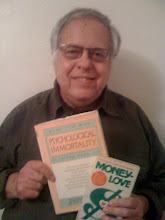Thursday, February 18, 2010
INTERNET BACKLASH
Sunday, February 7, 2010
FAVORITE QUOTES--MAKE THEM YOUR OWN
No News Is Good News
by Ryan Biddulph
Today’s Headlines
From cnn.com ‘Man sought whose wife, 5 children killed’
‘Terror suspect: Phone call is being monitored’
‘State-run media: Yemeni military’
‘Ex-stripper says priest fathered child’
‘Stricter punishments for passengers behaving badly’
See why I don’t watch the news?
What Good Does The News Do You?
Consider this quote by Jerry Gillies from ‘The MoneyLove Manifesto’:
‘If it doesn’t bring me profit, pleasure, or knowledge, it isn’t worth doing.’
Does reading the news serve you? Try going a week without picking up a newspaper. See how ‘lost’ you’ll be. I’ve heard the ‘head in the sand’ argument. I’d rather have my head in the sand than inhaling toxic fumes. The news thrives on negativity. Fear sells. Stories must be tailored to hit the target audience. This is why positive articles are buried on the last page. The general public thrives on negativity. It gives them something to worry about. The news is mental junkfood. Cut it out of your diet. Any other former news junkies out there who’ve made the decision to go cold turkey?
and I also found this link http://inspired-spirit.blogspot.com/2010/01/you-will-recognize-your-own-path-when.html
The above is a site called Inspirational Quotes Explained, and featured the following:
I can guarantee you that your path is NOT to be doing something that you do not enjoy.
I am not sure where the imagination fits into this, but I will take a stab at it: When you are doing something that you enjoy, you are likely to come up with lots of ideas on how to improve what you are doing or how to reach your goal.
Monday, February 1, 2010
FROM MONEYLOVE--ANOTHER PROSPERITY TALE
PROSPERITY WISDOM IN A GREAT MODERN FABLE
"Not very long," answered the Mexican.
"Then, why didn't you stay out longer and catch more?" asked the American.
The Mexican explained that his small catch was sufficient to meet his needs and those of his family.
The American asked, "But what do you do with the rest of your time?"
"I sleep late, fish a little, play with my children, and take a siesta with my wife. In the evenings, I go into the village to see my friends, have a few drinks, play the guitar, and sing a few songs. I have a full life."
The American interrupted, "I have an MBA from Harvard and I can help you! You should start by fishing longer every day. You can then sell the extra fish you catch. With the extra revenue, you can buy a bigger boat."
"And after that?" asked the Mexican.
"With the extra money the larger boat will bring, you can buy a second one and a third one and so on until you have an entire fleet of trawlers. Instead of selling your fish to a middle man, you can then negotiate directly with the processing plants and maybe even open your own plant. You can then leave this little village and move to Mexico City, Los Angeles, or even New York City! From there you can direct your huge new enterprise."
"How long would that take?" asked the Mexican.
"Twenty or twenty-five years," replied the American.
"And after that?"
"Afterwards? Well my friend, that's when it gets really interesting," answered the American, laughing. "When your business gets really big, you can start selling stocks and make millions!"
"Millions? Really? And after that?" said the Mexican.
"After that you'll be able to retire, live in a tiny village near the coast, sleep late, play with your children, catch a few fish, take a siesta with your wife, and spend your evenings drinking and enjoying your friends."
And the moral is: Know where you're going in life ... you may already be there.
